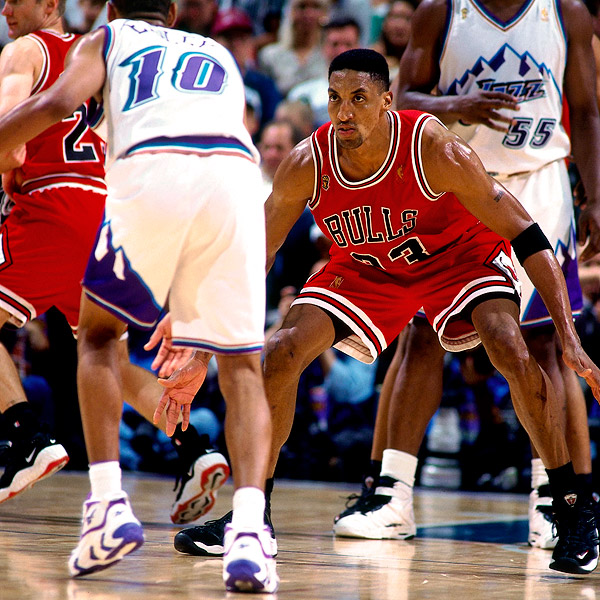f4p wrote:this is a weird part of the project. with hakeem in 6th and harden inside the top 30, my watch is ended, so to speak. at first glance, none of the nominees feel like they should be in the top 30, but at the same time, i'm at a loss for who should take their place. i suppose the mvp alphas are about the furthest i've ever really thought about actual specific rankings for players. i might think this guy or that guy belongs in the top 40 or the top 50, but actually putting a spot on it, i've never really gotten to that point.
Well, we [or at least
I] will miss your participation.
Regarding this approach, I suspect it's common, and it perhaps leads to the philosophical differences where some wouldn't give differing approaches [such as CORP-based, or similar] the time of day.......because it requires a complete rewire of their thinking on player ranking.
But as you've noted: if starting from the standpoint of looking only at "MVP alphas", you eventually
run out of those players as you get further down the list. So then what? Either one drops out of the project because they have no more to offer [feel "at a loss", as you said, for what to do]; or alternately, they begin a completely new criteria to rank who's left (which could be sort of like changing the rules in the middle of the game: one wouldn't necessarily have the same criteria for ranking players from start to finish).
How big a problem a LACK of internal consistency is to your process I suppose is subjective. Though imo, a process that involves literally moving of the goal-posts somewhere around the midway point should be viewed as a problem on some level.
I've got a list [needs updating] that goes well out into the 300's; and I wanted a process that was consistent and could be applied to ALL: from the LeBron's and Jordan's down to the Otis Birdsong's, Jack Marin's, Dick McGuire's of the game.
Therein is the beauty [imo] of a cumulative [though longevity-calibrated] value approach, of some sort.
f4p wrote:stockton actually does fairly well by the box score, certainly the longevity stuff like career VORP and WS, and even if i don't fully believe his late-career RAPM, it's not crazy to talk about him here, even if i'm not sure top 20 malone and top 30 stockton can really stand up to scrutiny with their team accomplishments. .
I don't know about the bolded (though people state similar sentiment often; but I just disagree).
I mean, they were the 2nd-best team of a DECADE, and perhaps clearly so; this in a very competitive era, trailing only one of the greatest sports dynasties of all-time. Looking at the overall breakdown of the 90's:
*They failed to win at least 50 games (at least 53, actually [pro-rating '99]) just ONCE (where they went 47-35). They won 60+ games FOUR TIMES (2nd to only the Bulls).
**ON AVERAGE, they won 56.57 games per season......
for a decade (is
barely 2nd to the Bulls for the decade, who avg 56.63 wins/season; 3rd-best were the Sonics with 52.70 wins/season, then 4th is the Suns at 52.03 wins/season). Seattle is the ONLY other team to not have a losing record at least once in the decade (though they had THREE seasons of .500).
***The Jazz AVERAGE SRS in the 90's was +5.28 (more or less contender-level, or close to it). That's 2nd to only Chicago's +5.59. 3rd is a bigger drop-off to Seattle at +4.70 (followed by an equally large gap to Phoenix at 4th with +4.12).
***Obviously, that put them in the playoffs all 10 seasons (Suns and Knicks were the only other teams of the decade to do so).
****They made it past the 1st round SEVEN times (3rd to only Chicago and New York in the decade).
*****They made it [at least] as far as the Conference Finals FIVE times in the decade (2nd to only Chicago).
******They have TWO teams inside the top-65 of Sansterre's 100 Greatest Teams (2nd to only Chicago in the decade), one of them in the top 35. They rate as the 7th and 10th-best teams of the entire decade.
That 10th-best team of the decade came with a fairly
weak bench (but the trio of Malone/Stockton/Hornacek was just so strong it carried to this level). fwiw, a weak bench (or weak from 4/5 thru 12) was a common occurrence throughout the late 80s and first half of the 90s, too. Some years they had a weak(ish) 3rd-best player. Mark Eaton was a defensive beast, but he was also an offensive liability. Frank Layden himself called Eaton an "empty uniform" on offense, and said that they were "basically playing 4 against 5 on offense" anytime Eaton was on the court.
The team rated 7th-best of the decade (35th of all-time) fell in the WCF in 7 games [though outscoring their opponent by nearly 3 ppg in the series, fwiw] to a team that is rated the 12th-best of the decade (75th-best of all-time). Though even if the Jazz had won that series, they'd have found themselves up against the
#1 team of the decade (#2 of all-time) in the Finals.
That 10th-best team of the decade DID make it to the Finals, but there faced the team rated 4th-best of the decade (14th of all-time), and fell in six games.
*******They made it to the NBA finals twice overall (tied with Houston and New York for 2nd in the decade). And save for a couple terrible shotclock calls [which wouldn't even be allowed to happen today], they may have been the WINNERS of the '98 Finals.
In as much as you lamented "Chris Paul's ****ing hamstring", one could lament "****ing shotclock calls".
It's no different.And would anyone think this would not "stand up to scrutiny" then? I doubt it.
Again, as much as people may say rings don't matter to them, they do.
This is to say nothing of additional respectable success they had in late 80s and early 00s (winning record and playoffs every year they were together).
"The fact that a proposition is absurd has never hindered those who wish to believe it." -Edward Rutherfurd
"Those who can make you believe absurdities, can make you commit atrocities." - Voltaire




:format(jpeg)/cdn.vox-cdn.com/uploads/chorus_image/image/45705238/1500516.0.jpg)


































